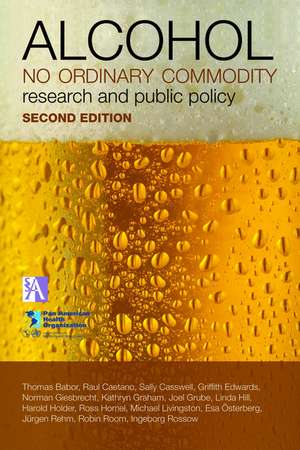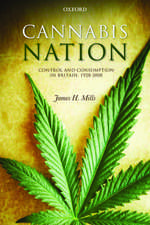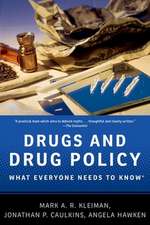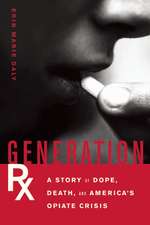Alcohol: No Ordinary Commodity: Research and Public Policy
Editat de Thomas F. Baboren Limba Engleză Paperback – 24 feb 2010
Preț: 445.01 lei
Preț vechi: 549.39 lei
-19% Nou
Puncte Express: 668
Preț estimativ în valută:
85.16€ • 92.47$ • 71.54£
85.16€ • 92.47$ • 71.54£
Carte disponibilă
Livrare economică 01-15 aprilie
Preluare comenzi: 021 569.72.76
Specificații
ISBN-13: 9780199551149
ISBN-10: 0199551146
Pagini: 378
Ilustrații: 11 black and white line drawings and 1 black and white halftone
Dimensiuni: 155 x 232 x 20 mm
Greutate: 0.6 kg
Ediția:Revised
Editura: Oxford University Press
Colecția OUP Oxford
Locul publicării:Oxford, United Kingdom
ISBN-10: 0199551146
Pagini: 378
Ilustrații: 11 black and white line drawings and 1 black and white halftone
Dimensiuni: 155 x 232 x 20 mm
Greutate: 0.6 kg
Ediția:Revised
Editura: Oxford University Press
Colecția OUP Oxford
Locul publicării:Oxford, United Kingdom
Recenzii
"The book reads with ease. The chapters are focussed and the subject well-described. I liked the breakdown of the chapters in small parts, well and clearly titled. I his helps to maintain the atter~~tioinn a subject that can be rather dry A thorough and very helpful overview of the impact that globalisation is having on the struggle countries face In their efforts (or lack of them) to try to manage the effects of drinking alcohol in thelr population and the impact onthe publlc health of their nations." \s BMA Med Book & Patinet Info Awards \s 2011
A valuable critical overview and analysis of the international research evidence on the harms and responses to alcohol problems in developed and developing countries. If we lived in a perfect world there would be a well-used, dog-eared, scribbled-on copy of the book on the desk on alcohol policy makers across the globe.
Like its predecessor, this excellent work is destined to prove an important influence on policy makers throughout the world. As one would expect with this pedigree, the book is meticulously referenced and it is peppered with case studies which highlight examples of preventive projects that have succeeded and might be adopted elsewhere. Whosoever is responsible for commissioning or advocating alcohol policy and services should read this book.
A valuable critical overview and analysis of the international research evidence on the harms and responses to alcohol problems in developed and developing countries. If we lived in a perfect world there would be a well-used, dog-eared, scribbled-on copy of the book on the desk on alcohol policy makers across the globe.
Like its predecessor, this excellent work is destined to prove an important influence on policy makers throughout the world. As one would expect with this pedigree, the book is meticulously referenced and it is peppered with case studies which highlight examples of preventive projects that have succeeded and might be adopted elsewhere. Whosoever is responsible for commissioning or advocating alcohol policy and services should read this book.
Notă biografică
Thomas Babor is a Professor and Chairman in the Department of Community Medicine and Health Care, University of Connecticut School of Medicine. He holds the University's Physicians Health Service endowed chair in Public Health and Community Medicine. Dr. Babor received his doctoral degree in social psychology from the University of Arizona in 1971. He spent several years in postdoctoral research training in social psychiatry at Harvard Medical School, andsubsequently served as head of social science research at McLean Hospital's Alcohol and Drug Abuse Research Center in Belmont, Massachusetts. Since 1997 he has been chairman of the Department of Community Medicine and Health Care at the University of Connecticut School of Medicine. He is AssociateEditor-in-Chief as well as Regional Editor of the international journal, Addiction. His research interests include screening, diagnosis, early intervention, and treatment evaluation, as well as cultural and policy issues to alcohol and drug problems.Raul Caetano is a psychiatrist and an epidemiologist who has written about alcohol consumption, drinking problems, and about the relationship between drinking and intimate partner violence among U.S. ethnic minorities. He is also interested in the development of methodology to identify and diagnose alcohol problems, in the cross-cultural validity of diagnostic categories such as alcohol abuse and dependence and in public health policy in the alcohol field. He is Dean and Professor of HealthCare Sciences and Psychiatry at the Southwestern School of Health Professions, University of Texas Southwestern Medical Center at Dallas, and he is also Professor of Epidemiology and Regional Dean of the Dallas Regional Campus, University of Texas School of Public Health.Sally Casswell is Professor of Social and Health Research and the Director of the Centre for Social and Health Outcome Research and Evaluation (SHORE) at Massey University and a fellow of the Royal Society of New Zealand. Her research interests are in social and public health policy, particularly in relation to alcohol and other drugs, social survey design, evaluation research and community engagement. Current research projects include studies of the impact of alcohol marketing on young NewZealanders, and of the impact of drinking on other than the drinker. Professor Casswell is involved in international alcohol policy as a member of the WHO Expert Advisory Panel on Drug Dependence and Alcohol Problems and in the provision of technical advice. Professor Casswell has an active involvementwith the NGO sector including GAPA (Global Alcohol Policy Alliance) and APAPA (Asia Pacific Alcohol Policy Alliance) and is involved in collaborative work on alcohol in South East Asia and the Pacific.Griffith Edwards was Director of the Addiction Research Unit of the Institute of Psychiatry from 1967 to 1994 and assisted in the foundation of the National Addiction Centre. He was closely involved for many years in the British drugs advisory system, advised the White House, and was a member of the relevant WHO Advisory panel. Edwards is Assistant Commissioning Editor, Addiction; former Editor-in-Chief, Addiction; and author of Alcohol: the world's favourite drug.Norman Giesbrecht is Senior Scientist, Public Health & Regulatory Section, Centre for Addiction and Mental Health, Toronto, and has a cross-appointment with the Dalla Lana School of Public Health, University of Toronto. He received Ph D from U. of Toronto in Sociology (1980). His research includes: impacts of policies on drinking-related harm, assessments of the policy development process, impacts of drinking patterns on trauma and chronic disease, community-based prevention strategies andpublic health priorities. In 2007 he received a life-time achievement award from the American Public Health Association (APHA). He has been a participant in several WHO-affiliated projects, and is currently the chair of the Publications Board of APHA. He is active in chronic disease preventionorganizations in Toronto, as well provincially and nationally.Kathryn Graham (Ph.D, Psychology) is a Senior Scientist and Head of Social and Community Prevention Research at the Centre for Addiction and Mental Health (CAMH) in London, Ontario, Canada, Adjunct Research Professor in the Department of Psychology at the University of Western Ontario, and Professor (Adjunct), National Drug Research Institute, Curtin University of Technology, Perth, Western Australia. Her current research focuses on the role of alcohol in aggressive behaviour both in licensedpremises and between intimate partners, the social context of aggression and gender differences in the relationship between alcohol and aggression. Her work in the community has included the development and evaluation of the Safer Bars program to reduce aggression in licensed premises. In 2002, Dr.Graham received the Queen's Golden Jubilee Medal for her contributions to applying research knowledge to community interventions.Joel W. Grube, Ph.D. is Director and Senior Research Scientist at the Prevention Research Center, Pacific Institute for Research and Evaluation, in Berkeley, California. He was a member of the Institute of Medicine/National Research Council Committee on Developing a Strategy to Reduce and Prevent Underage Drinking (2003-2003) for the National Academies of Science. He is currently a member of the National Academies of Science/National Research Council Transportation Research Board Committee onAlcohol, Other Drugs, and Transportation (2003-present). His research focuses on social-psychological and environmental factors influencing drinking and other problem behaviors among adolescents and young adults. His current projects include longitudinal studies of community policies and underagedrinking and tobacco use.Dr Linda Hill is a policy researcher who has worked on alcohol issues since 1995, for the University of Auckland's Alcohol and Public Health Research Unit, the New Zealand Drug Foundation, and on projects for government agencies. Much of this work has related to liquor licensing, including the roles of local governments and public health agencies. She has written on alcohol advertising for two international books on alcohol research and policy. In 2004-05 she worked for the Global AlcoholPolicy Alliance, supporting networking among Pacific Islands NGOs and monitoring globalization by the alcohol industry. Since 2006 she has been a senior researcher with the SHORE Centre, Massey University, Auckland, and is retiring this year.Dr. Holder is a Senior Research Scientist of the Prevention Research Center (PRC) of the Pacific Institute for Research and Evaluation, Berkeley, California. He was director for 18 years. Dr. Holder was one of the first researchers to undertake controlled studies on the economic benefits of alcoholism treatment. Dr. Holder was chosen, by a board of distinguished international scientists, as the recipient of the 1995 Jellinek Memorial Award for his research on social and economic factors ofalcohol consumption, and the impact of changes in alcohol availability on alcohol problems. He received the President's Award from the Society for Prevention Research in 2001 for scientific leadership, and in 2005, Dr. Holder was given a Lifetime Achievement Award from the Research Society on AlcoholismRoss Homel is Foundation Professor of Criminology and Criminal Justice at Griffith University in Brisbane, Australia, and Director of the Griffith Institute for Social and Behavioural Research, a virtual network of over 100 academic staff in the social and behavioural sciences. He has held senior research management positions within Griffith University since 1993 including as Director of the highly successful Australian Research Council Key Centre for Ethics, Law, Justice and Governancebetween 2004 and 2007. He was responsible (with Jan Carter) for establishing a national set of research priorities to advance the wellbeing of children and young people and for setting up a new Australian Research Council research network, while undertaking a half time role with the Australian ResearchAlliance for Children and Youth in 2002 and 2003.With a background in statistics and criminology, Michael Livingston commenced research into alcohol policy and alcohol-related harm in 2006 and has a growing local and international profile. Michael has applied a range of quantitative methodologies to alcohol epidemiology and alcohol policy analysis. In 2007, Michael was awarded the Kettil Bruun Society for Social and Epidemiological Research on Alcohol young scientist award for work examining how alcohol availability related to violence.Michael has recently awarded a Sidney Myer Fund Health Scholarship to fund doctoral studies in the School of Population Health at the University of Melbourne to expand his research into the effects of changes in liquor licensing regulation on alcohol-related problems.Esa Österberg works currently as senior researcher at the Alcohol, Drugs and Addiction department of the National Institute for Health and Welfare in Helsinki, Finland. Prior to his current position he worked in 1973-1996 as a researcher at the Social Research Institute of Alcohol Studies and in 1966-2008 as a senior researcher at the Alcohol and Drug Research Group of the National Research and Development Centre for Welfare and Health. In Finland, Österberg has had the mainresponsibility for the estimation of unrecorded alcohol consumption since 1984. At the moment he also participating the Nordic Tax Study investigating the effects of recent alcohol tax changes in the Nordic countries and Border Trade with alcohol in the Nordic Countries (GRAN).Jürgen Rehm (Ph.D. psychology and methodology; University Mannheim 1985) has been working in the area of substance use for over a decade and is Co-Head of the "Public Health and Regulatory Policy " section at the Centre for Addiction and Mental Health in Toronto, Canada. He also holds a Chair position in Addiction Policy, Dalla Lana School of Public Health, University of Toronto, and is heading a section on epidemiological research at the TU Dresden, Germany. He has been responsible forthe Comparative Risk Assessment (CRA) on alcohol within the Global Burden of Disease 2000 study, and is currently Co Principal Investigator of the CRA on the same topic within the GBD 2005 study. Dr. Rehm has also been PI on numerous projects for the World Health Organization, the World Bank, theNational Institutes of Health and various governments.Robin Room is an Australian sociologist who worked for many years in alcohol and drug studies in the U.S., Canada, Norway and Sweden. Since 2006, he has been a Professor in the School of Population Health of the University of Melbourne and the Director of the AER Centre for Alcohol Policy Research at Turning Point Alcohol and Drug Centre. He has worked on social, cultural and epidemiological studies of alcohol, drugs and gambling behaviour and problems, and studies of social responses toalcohol and drug problems and of the effects of policy changes.Ingeborg Rossow is Research Director at the Norwegian Institute for Alcohol and Drug Research.









